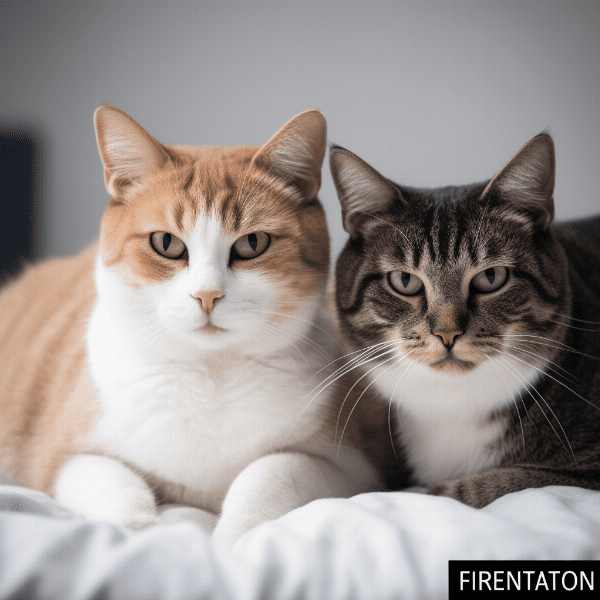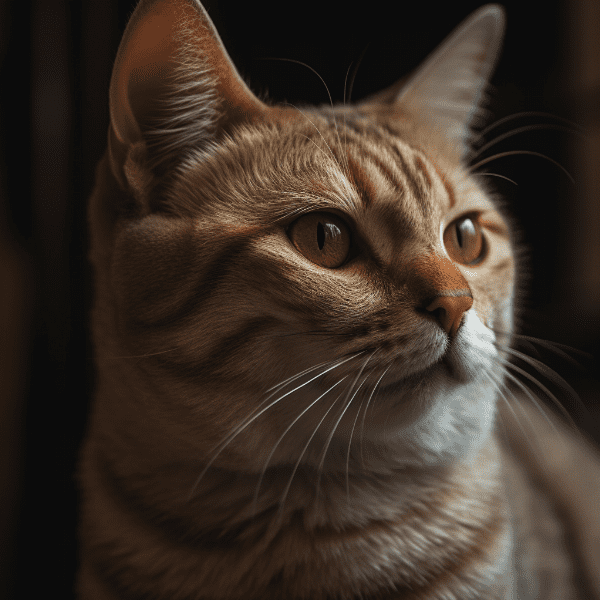Table of Contents
- What is Feline Infectious Enteritis?
- Causes and Transmission of Feline Infectious Enteritis
- Signs and Symptoms of Feline Infectious Enteritis
- Diagnosis of Feline Infectious Enteritis
- Treatment Options for Feline Infectious Enteritis
- Home Care for Cats with Feline Infectious Enteritis
- Preventing Feline Infectious Enteritis
- Importance of Vaccination for Feline Infectious Enteritis
- Feline Infectious Enteritis and Other Cats Diseases
- Conclusion: Feline Infectious Enteritis – A Serious but Preventable Disease
What is Feline Infectious Enteritis?
Feline infectious enteritis (FIE), also known as feline panleukopenia, is a highly contagious viral disease that affects cats worldwide. The virus targets rapidly dividing cells in the body, such as those found in the intestines, bone marrow, and lymphoid tissue, causing severe damage to these organs.
Conclusion
Feline infectious enteritis is a serious viral disease that can have devastating effects on cats. Knowing the causes, transmission routes, and risk factors associated with FIE can help cat owners take the necessary precautions to prevent the spread of this deadly virus. Vaccination is the most effective way to protect cats against FIE, and all cats should receive the vaccine as part of their routine healthcare.
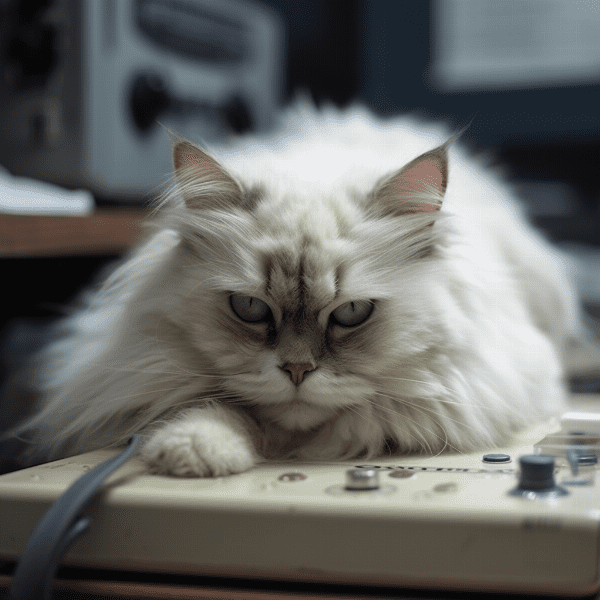
Causes and Transmission of Feline Infectious Enteritis
Feline infectious enteritis (FIE) is caused by feline parvovirus (FPV), a highly contagious virus that targets rapidly dividing cells in the body. FPV is a small, non-enveloped virus that is highly resistant to environmental factors and can survive for months or even years in the environment.
How FPV is Spread
Cats can become infected with FPV through direct contact with an infected cat’s body fluids, such as saliva, feces, urine, or blood. The virus can also be transmitted indirectly through contact with contaminated objects, such as food bowls, litter boxes, or clothing. Cats that are pregnant and infected with FPV can also transmit the virus to their unborn kittens in utero, leading to fetal death or birth defects.
Prevention of FIE
Preventing the spread of FIE can be challenging, but there are several steps that cat owners can take to protect their feline friends. Vaccination is the most effective way to prevent FIE, and all cats should receive the vaccine as part of their routine healthcare. Cat owners should also practice good hygiene and disinfect their cat’s living environment regularly. If a cat in the household is diagnosed with FIE, it’s essential to isolate the infected cat and follow proper cleaning protocols to prevent the virus from spreading to other cats.
Conclusion
Feline infectious enteritis is a highly contagious viral disease that can have severe consequences for infected cats. Understanding the causes and transmission routes of FPV is crucial in preventing the spread of this deadly virus. Vaccination and good hygiene practices are key in protecting cats from FIE and ensuring their long-term health and well-being.
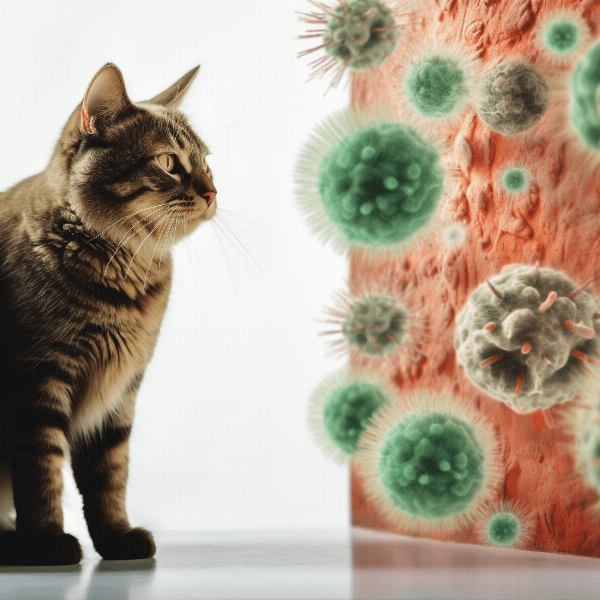
Signs and Symptoms of Feline Infectious Enteritis
Feline infectious enteritis (FIE) is a viral disease that attacks rapidly dividing cells in the body, including those found in the intestines, bone marrow, and lymphoid tissue. The virus can cause severe damage to these organs and can have serious consequences for infected cats.
Early Signs of FIE
The early signs of FIE can be difficult to recognize, as they are often nonspecific and can mimic other diseases. Cats infected with FIE may initially exhibit symptoms such as loss of appetite, lethargy, fever, and dehydration. These symptoms can progress quickly and become more severe within a matter of days.
Gastrointestinal Symptoms
As the virus attacks the intestines, cats with FIE may develop vomiting, diarrhea, and abdominal pain. The diarrhea can be profuse, watery, and foul-smelling, and can lead to dehydration and electrolyte imbalances. Severe cases of FIE can cause intestinal perforation, which can lead to septicemia and death.
Neurological Symptoms
In some cases, FIE can affect the nervous system and cause symptoms such as tremors, ataxia (loss of coordination), and seizures. These symptoms can be particularly severe in young kittens, and can lead to permanent neurological damage or death.
Other Symptoms
In addition to gastrointestinal and neurological symptoms, cats with FIE may also exhibit other symptoms such as pale gums, rapid breathing, and anemia. The virus can also suppress the immune system, making infected cats more susceptible to secondary infections.
Conclusion
Feline infectious enteritis is a serious viral disease that can cause significant damage to a cat’s body. Recognizing the early signs of FIE and seeking prompt veterinary care can help improve the chances of a successful outcome for infected cats. Vaccination is the most effective way to prevent FIE, and all cats should receive the vaccine as part of their routine healthcare.
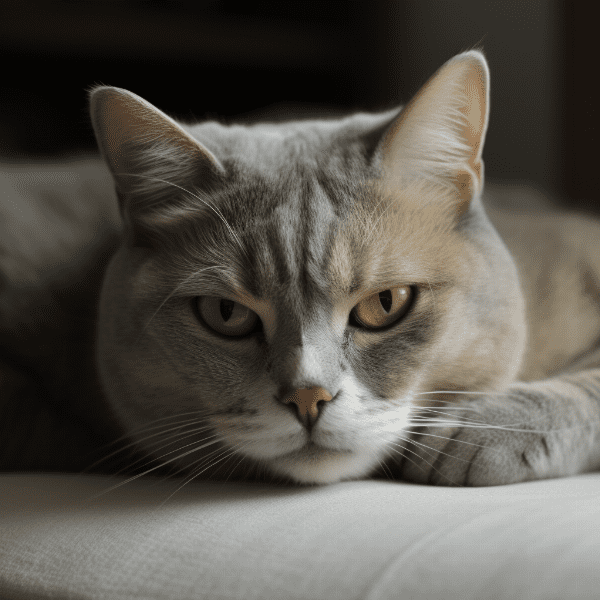
Diagnosis of Feline Infectious Enteritis
Feline infectious enteritis (FIE) is a viral disease that can cause severe damage to a cat’s body. Diagnosing FIE can be challenging, as the symptoms can mimic those of other diseases, and not all cats infected with the virus will exhibit symptoms.
Veterinary Examination
If a cat is exhibiting symptoms of FIE, the first step in diagnosis is a thorough physical examination by a veterinarian. The veterinarian will evaluate the cat’s overall health, assess the severity of any symptoms, and perform diagnostic tests to determine the underlying cause of the symptoms.
Blood Tests
Blood tests can be used to evaluate a cat’s white blood cell count, which is often low in cats with FIE. The virus can also cause anemia, so a complete blood count can help diagnose this condition. In addition, blood chemistry panels can help evaluate kidney and liver function, which can be affected by the virus.
Fecal Tests
Fecal tests can be used to identify the presence of FPV in infected cats. The virus can be shed in feces for several weeks after infection, so a fecal test can be a useful diagnostic tool. However, false negatives can occur, and the test is not always reliable.
Imaging Tests
In severe cases of FIE, imaging tests such as X-rays or ultrasounds may be used to evaluate the extent of organ damage. These tests can help identify abnormalities such as fluid accumulation in the abdomen or changes in the intestines.
Conclusion
Diagnosing FIE can be challenging, as the symptoms can mimic those of other diseases, and not all infected cats will exhibit symptoms. If a cat is exhibiting signs of FIE, it’s essential to seek veterinary care promptly. Diagnostic tests such as blood work, fecal tests, and imaging can help identify the underlying cause of the symptoms and guide treatment decisions. Vaccination is the most effective way to prevent FIE, and all cats should receive the vaccine as part of their routine healthcare.
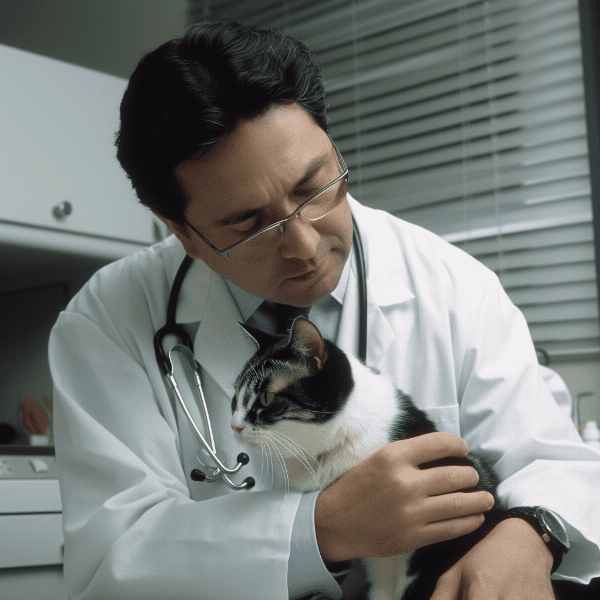
Treatment Options for Feline Infectious Enteritis
Feline infectious enteritis (FIE) is a serious viral disease that can cause severe damage to a cat’s body. Treatment for FIE is supportive and aimed at managing the symptoms and complications associated with the disease.
Hospitalization
Cats with FIE may require hospitalization to receive supportive care, such as intravenous fluids, electrolyte replacement therapy, and antibiotics to prevent secondary bacterial infections. Hospitalization can also help prevent the spread of the virus to other cats.
Fluid Therapy
Dehydration is a common complication of FIE, and cats with the disease may require intravenous fluid therapy to help rehydrate the body and restore electrolyte balance. Fluid therapy can also help support the function of the kidneys and other organs affected by the virus.
Nutritional Support
Cats with FIE may have a reduced appetite or difficulty eating due to gastrointestinal symptoms such as vomiting and diarrhea. Nutritional support, such as feeding through a feeding tube, may be necessary to ensure that the cat receives adequate nutrition.
Medications
There are no specific antiviral medications available to treat FIE, but medications such as anti-nausea drugs, pain relief medications, and antibiotics may be used to manage symptoms and prevent secondary infections.
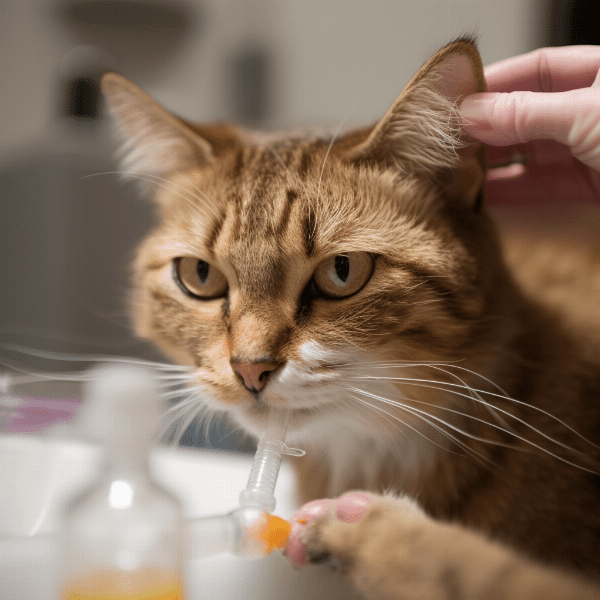
Home Care for Cats with Feline Infectious Enteritis
Cats with feline infectious enteritis (FIE) may require hospitalization and intensive veterinary care. However, once the cat is stabilized, they may be discharged and sent home to continue their recovery. Home care for cats with FIE can help ensure that the cat receives the care and support necessary to recover fully.
Hydration
Dehydration is a common complication of FIE, so it’s essential to ensure that the cat receives adequate hydration at home. Provide fresh water at all times and encourage the cat to drink by offering low-sodium chicken broth or water from a tuna can.
Nutrition
Cats with FIE may have a reduced appetite or difficulty eating due to gastrointestinal symptoms such as vomiting and diarrhea. Offer small, frequent meals of a bland diet, such as boiled chicken and rice, to help reduce the risk of further digestive upset.
Medications
If the cat has been prescribed medication, it’s essential to follow the veterinarian’s instructions regarding dosing and administration. Keep track of when medications are due and make sure that the cat receives them as prescribed.
Monitoring
Monitor the cat’s symptoms closely and watch for any changes in behavior or appetite. If the cat’s symptoms worsen or new symptoms develop, contact the veterinarian immediately.
Conclusion
Home care for cats with FIE can help ensure that the cat receives the care and support necessary to recover fully. Isolation, hydration, nutrition, medication management, and monitoring can help manage symptoms and complications associated with the disease. Vaccination is the most effective way to prevent FIE, and all cats should receive the vaccine as part of their routine healthcare.
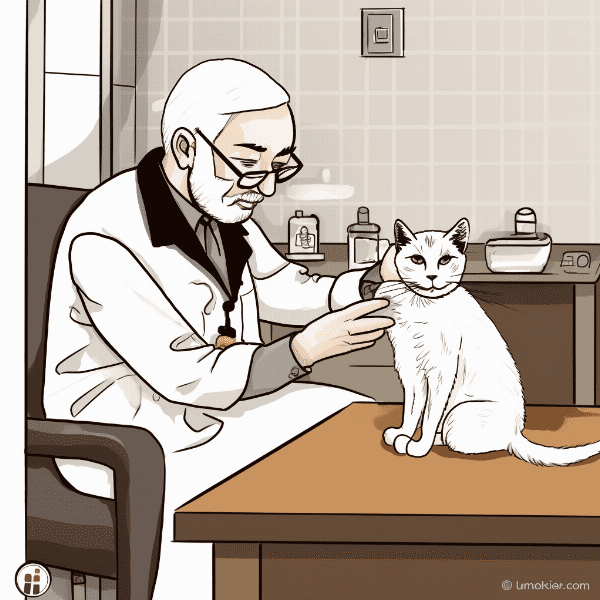
Preventing Feline Infectious Enteritis
Good Hygiene
Practicing good hygiene can help reduce the risk of FIE. Clean litter boxes and food bowls regularly with soap and water. Wash your hands thoroughly after handling cats or their litter boxes. If you have multiple cats, provide separate litter boxes and feeding bowls for each cat.
Isolation
If you have a cat that has been diagnosed with FIE, it’s essential to isolate the cat from other cats in the household to prevent the spread of the virus. Isolation should continue for at least two weeks after the cat’s symptoms have resolved.
Avoiding High-Risk Situations
Cats living in crowded or unsanitary conditions, such as animal shelters or multi-cat households, are at increased risk of infection. Avoiding high-risk situations can help reduce the risk of FIE. If you have multiple cats, make sure that they have adequate space and access to clean litter boxes and feeding bowls.
Conclusion
Preventing the spread of FIE is essential in protecting the health and well-being of cats. Vaccination, good hygiene practices, isolation, and avoiding high-risk situations can all help reduce the risk of FIE. Vaccination is the most effective way to prevent FIE, and all cats should receive the vaccine as part of their routine healthcare.
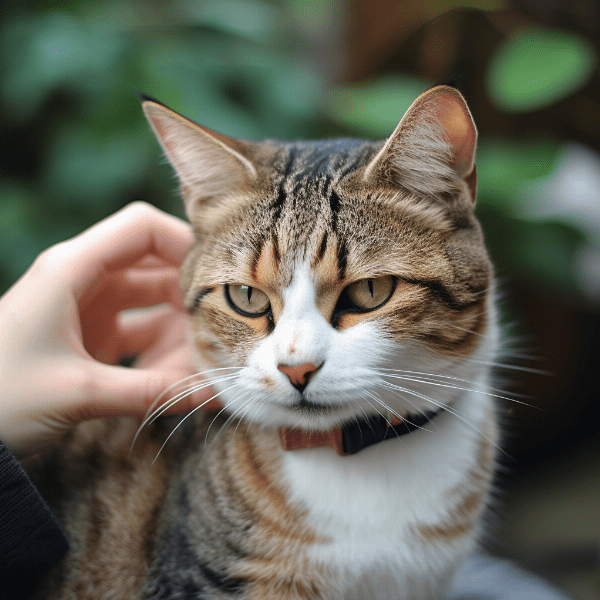
Importance of Vaccination for Feline Infectious Enteritis
Vaccination is the most effective way to prevent feline infectious enteritis (FIE), a highly contagious viral disease that can have serious consequences for infected cats. Vaccination not only protects individual cats but also helps prevent the spread of the virus in the community.
How Vaccines Work
Vaccines work by stimulating the cat’s immune system to produce antibodies against the virus. If the cat is exposed to the virus in the future, the antibodies will recognize and destroy the virus before it can cause infection.
FIE Vaccines
FIE vaccines are highly effective in preventing the disease. They are available as part of a combination vaccine that protects against other common feline diseases, such as feline calicivirus and feline herpesvirus.
Vaccine Schedule
Kittens should receive their first FIE vaccine at six to eight weeks of age, followed by booster shots every three to four weeks until they are 16 weeks old. Adult cats should receive a vaccine booster annually.
Risks and Benefits of Vaccination
Vaccination is generally safe for cats and has few side effects. The benefits of vaccination far outweigh the risks, as FIE can have serious consequences for infected cats. The cost of vaccination is also significantly lower than the cost of treating an infected cat.
Conclusion
Vaccination is the most effective way to prevent feline infectious enteritis. FIE vaccines are highly effective, and all cats should receive the vaccine as part of their routine healthcare. Vaccination not only protects individual cats but also helps prevent the spread of the virus in the community. The risks of vaccination are minimal, and the benefits far outweigh the risks.
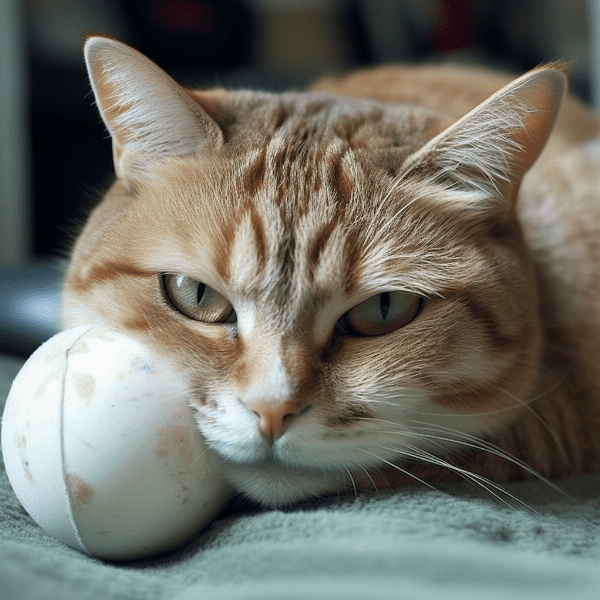
Feline Infectious Enteritis and Other Cats Diseases
Feline infectious enteritis (FIE) is a serious viral disease that can have severe consequences for infected cats. FIE can also increase the risk of other diseases in infected cats.
Feline Immunodeficiency Virus
Feline immunodeficiency virus (FIV) is another viral disease in cats that can affect the immune system. FIV is transmitted through bite wounds, and infected cats may exhibit symptoms such as weight loss, fever, and anemia. Cats infected with FIE may be at increased risk of contracting FIV, as the virus can weaken the immune system and make cats more susceptible to secondary infections.
Feline Herpesvirus
Feline herpesvirus is another common respiratory virus in cats that can cause symptoms such as sneezing, coughing, and eye discharge. Similar to feline calicivirus, infected cats may be more susceptible to feline herpesvirus due to their weakened immune system.
Conclusion
Feline infectious enteritis can increase the risk of other diseases in infected cats, as the virus can weaken the immune system and make cats more susceptible to secondary infections. Vaccination is the most effective way to prevent FIE and can help reduce the risk of other diseases in cats. Regular veterinary check-ups and good hygiene practices can also help prevent the spread of diseases in the cat population.
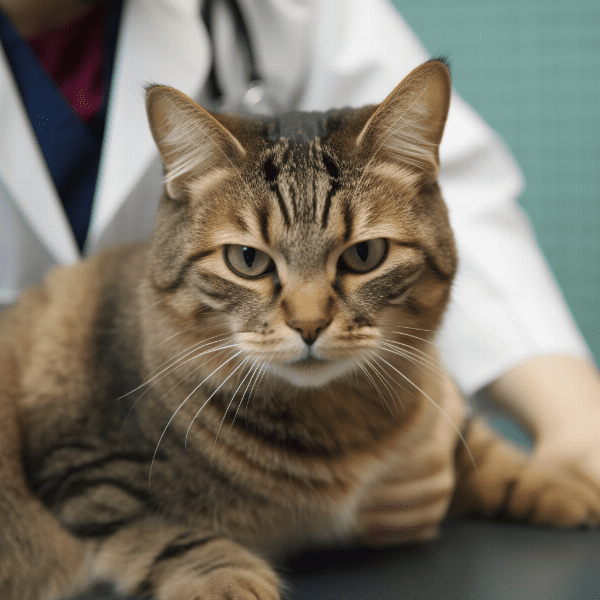
Conclusion: Feline Infectious Enteritis – A Serious but Preventable Disease
Feline infectious enteritis (FIE) is a serious viral disease that can have severe consequences for infected cats. The disease can cause a wide range of symptoms, including vomiting, diarrhea, and dehydration, and can lead to long-term damage to the digestive system.
However, FIE is also a preventable disease. Vaccination is the most effective way to prevent FIE, and all cats should receive the vaccine as part of their routine healthcare. Good hygiene practices, such as regular cleaning of litter boxes and food bowls, can also help reduce the risk of FIE and other diseases in cats.
If your cat is exhibiting symptoms of FIE, it’s essential to seek veterinary care promptly. Early diagnosis and treatment can help manage symptoms and prevent long-term complications.
In conclusion, FIE is a serious but preventable disease. Vaccination, good hygiene practices, and early veterinary care can help protect the health and well-being of cats and prevent the spread of the virus in the cat population.
